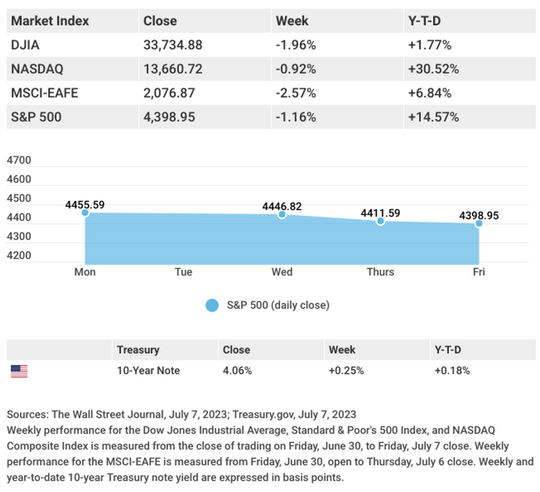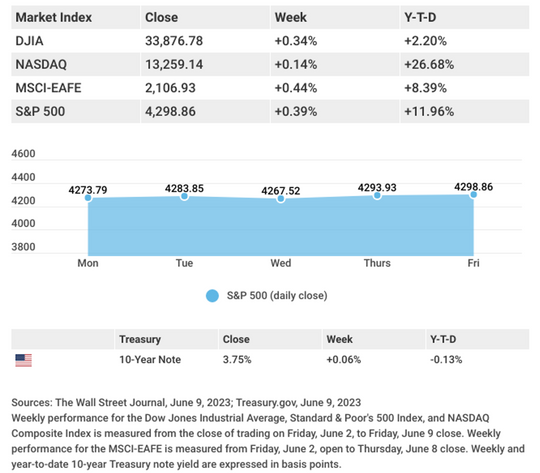Weekly Market Insights: Bad News for Bears; Good News Buoys Markets
|
Better-than-expected updates last week on consumer and wholesale price inflation buoyed investor sentiment, driving stocks higher and lower bond yields. The Dow Jones Industrial Average rose 2.29%, while the Standard & Poor’s 500 increased 2.42%. The Nasdaq Composite index advanced 3.32% for the week. The MSCI EAFE index, which tracks developed overseas stock markets, gained 4.67%.1,2,3 |
|
|
|
|
Inflation Sparks StocksBack-to-back positive inflation reports emboldened investors, sending stocks to their highest levels since April 2022. Lower-than-forecast inflation on both consumer prices and producer prices sparked investor optimism that inflation may be able to fall further without tipping the economy into recession and provide the basis for the Fed to moderate its more hawkish rate hike stance.4 After four straight days of increases, investor attention turned to the kick-off of a new earnings season on Friday. Despite some positive earnings surprises from several big banks and a major healthcare provider, stocks closed out a good week with a slight decline. Inflation CoolsInflation continued its downward trend last month, falling at its slowest pace in over two years. Consumer prices rose 0.2% in June and 3.0% from a year ago. Both were below economists’ consensus forecast. Core inflation (excludes food and energy), which has been more stubborn, fell to 4.8% year-over-year–its lowest level since October 2021.5 The positive disinflationary story continued the following day with a lighter-than-forecast increase in producer prices. Wholesale prices increased 0.1% in June, which was lower than the consensus forecast of 0.2%. The increase from a year ago was also 0.1%, representing the smallest gain in nearly three years. Core producer price rose 2.6% year-over-year.6 This Week: Key Economic DataTuesday: Retail Sales. Industrial Production. Wednesday: Housing Starts. Thursday: Existing Home Sales. Index of Leading Economic Indicators. Jobless Claims. Source: Econoday, July 14, 2023 This Week: Companies Reporting EarningsTuesday: Bank of America Corporation (BAC), Lockheed Martin Corporation (LMT), Morgan Stanley (MS), The Charles Schwab Corporation (SCHW), The PNC Financial Services Group, Inc. (PNC), Prologis, Inc. (PLD) Wednesday: Netflix, Inc. (NFLX), Tesla, Inc. (TSLA), International Business Machines Corporation (IBM), The Goldman Sachs Group, Inc. (GS) Thursday: Johnson & Johnson (JNJ), Blackstone, Inc. (BX), Intuitive Surgical, Inc. (ISRG), Abbott Laboratories (ABT), American Airlines Group, Inc. (AAL), CSX Corporation (CSX), Freeport-McMoRan, Inc. (FCX), United Airlines Holdings, Inc. (UAL), Capital One Financial Corporation (COF) Friday: American Express Company (AXP) Source: Zacks, July 14, 2023 |
|
|
|
“Half of wisdom is learning what to unlearn.” – Larry Niven |
|
|
Do You Need To Report Cash Payments?If you receive a cash payment over $10,000, you may be required to report it to the Internal Revenue Service (IRS). In this case, a cash payment includes US or foreign currency and can also include cashier’s checks, bank drafts, traveler’s checks, or money orders. In addition, cash payments to an individual can also include payments from companies, corporations, partnerships, associations, trusts, or estates. For example, this could include:
This requirement can apply to cash payments received in one lump sum or two or more payments over time. Check the IRS website for more specifics regarding what constitutes a reportable transaction. So how do you report cash payments? Taxpayers should complete Form 8300, Report of Cash Payments Over $10,000 Received in a Trade or Business. You can file this form electronically or mail a copy to the IRS. You must submit Form 8300 within 15 days of receiving the cash payment. *This information is not intended to substitute for specific individualized tax advice. We suggest you discuss your specific tax issues with a qualified tax professional. Tip adapted from IRS.gov7 |
|
|
What Are Polyphenols?You may have heard of polyphenols, as they’re getting a lot of buzz in the health and wellness community. But what are they, and what are their benefits? Polyphenols are a category of plant compounds that may offer various health benefits, from boosting brain health and digestion to protecting against heart disease, type 2 diabetes, and even some cancers. There are many sources of polyphenols, including dark chocolate, tea, and dark berries. Even red wine may contain polyphenols. There are four main types of polyphenols:
Tip adapted from Healthline8 |
|
|
|
What is the longest word in English to have only one vowel repeated? (Hint: It has 18 total letters, and the vowel repeats four times.)
Last week’s riddle: What lives above a star but never burns, has 11 neighbors, and can replace the letters P, Q, R, or S in some cases? Answer: The number 7 on most telephone keypads. |
|
|
|
|
|
African Bush Elephants, Botswana Elephant Preserve, Africa |
Footnotes And Sources1. The Wall Street Journal, July 14, 2023 2. The Wall Street Journal, July 14, 2023 3. The Wall Street Journal, July 14, 2023 4. The Wall Street Journal, July 13, 2023 5. The Wall Street Journal, July 12, 2023 6. The Wall Street Journal, July 13, 2023 7. IRS.gov, February 15, 2023 8. Healthline, February 15, 2023 |























